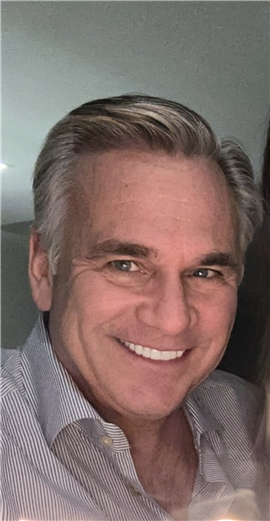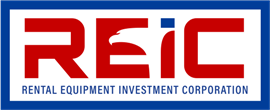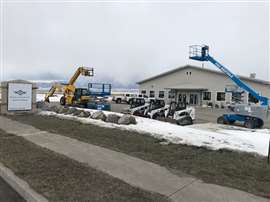Read this article in 中文 Français Deutsch Italiano Português Español
Interview: Kevin Fitzgerald talks about REIC’s increased focus on specialty rental
20 March 2024
REIC saw the potential in specialty rental a decade ago, and its executive chairman says there’s every reason to stay the course for the future. Jenny Lescohier reports.
REIC stands for Rental Equipment Investment Corp., and it’s a Miami-based holding company made up of acquired independent rental companies which still operate under their original brands. The business model was founded by Kevin Fitzgerald, who saw it as a way for smaller companies to benefit from the availability of corporate funding while holding onto the legacies they’ve built over decades.
The current business climate in equipment rental shows the big getting bigger, but there remains a place for independents. REIC offers itself as a hybrid of the two worlds, but also as a poster child for what an investment in specialty rental can do for cash flow and increased valuation.
To find out how it all works, we sat down with Kevin Fitzgerald, executive chairman of REIC, at The ARA Show in New Orleans last month. Here’s what he had to say about his company, where it’s headed, as well as the future of the industry.
Rental Briefing: Tell us about your role in the history of REIC
 Kevin Fitzgerald, executive chairman, REIC. (Photo: REIC)
Kevin Fitzgerald, executive chairman, REIC. (Photo: REIC)
Fitzgerald: I started advising Neff Corp. as an investment banker in ‘93-’94. That’s where I was first introduced to the rental business. I was hired as CEO of Neff Corp. in 1995 and I proceeded to execute a business plan; we bought 13 companies and did 26 green fields in five years. We took the company public in ‘98.
I left Neff in 2000 and went on to do business elsewhere, but decided to get back into rental in 2013. Then in 2014, I came up with a plan to start Rental Equipment Investment Corp.
The idea was to form a holding company and acquire rental assets under one umbrella, with different brand names underneath. I knew at the time I would never become United Rentals or Sunbelt, so I needed to distinguish myself in some other way. I decided the best way of doing that was to buy other companies, keep the brand names in place, and amalgamate them under one holding company with one bank source, one back office, etc.
I started the business in 2014 with my own money, along with some friends and investors. We put our pool of money together and proceeded to go online to look at companies to buy. We came across Midway Rental, based in Kalispell, Montana, a four-store group. We closed the deal in December of 2014.
That gave me a mini platform with the back office. We now have acquired 19 companies and opened five green fields. We currently have 52 locations, 30 of which are what I call general rental, 22 are specialty rental. Specialty rental was a big move for us in 2020.
Rental Briefing: What prompted the move to get into specialty rental?
Fitzgerald: I knew specialty was an important way for a company like ours to get more long-lived assets. The maintenance capex is much less with specialty equipment, which is key to free cash flow, and therefore, the ability to fund is much easier and the multiples are higher on acquisition for specialty, compared to general rental.
Specialty rental/longer-lived assets don’t get beat up as much as construction assets, the dollar utilization for specialty is higher, and the capex is considerably less. The maintenance side is a key thing, particularly when it comes to financing. A lot of lenders will look at your EBITDA and they’ll say fine, but what’s your maintenance capex?
Rental Briefing: How much of REIC’s business is focused on specialty rentals?
Fitzgerald: In 2021, specialty was still only 5% to 10% of our business. It was then that our shareholders decided they wanted more liquidity, so at the end of ‘21, we consummated a sales transaction with a private equity group in New York called Kinderhook Industries.
We ended up selling the business to them in December, 2021, seven years after I started REIC. We rolled over some of our equity into the new company and I remained as CEO until this year when I became executive chairman. The majority of the company is owned by Kinderhook Industries.
By the end of 2023, specialty was around 45% of our business, and by the end of this year, it’ll be over 50% of our revenue stream.
We’re still growing general rental, of course, but specialty has become a big part of our business. Right now, we have HVAC and compressors, as well as some specialty hybrid light towers, direct-fire and indirect-fire heaters, chillers and dehumidifiers.
It seems obvious to me when running a rental business that you need to diversify and bring in assets that have a longer life and less maintenance capex. The flip side is if you want to buy

those companies at higher multiples, then you need to have a lot of equity to do that.
A lot of individuals and sole proprietors don’t have that equity to put back in, but we do because we have our partners at Kinderhook who can provide, as appropriate, all the funding we need. To really grow in the rental industry, you need a large, well-funded equity partner. REIC has that in Kinderhook Industries.
Rental Briefing: Where do see this trend going for REIC?
Fitzgerald: If you were to look at us three to four years from now, I’d say REIC will probably be 60% to 65% specialty, with the remainder being general rental.
I think for REIC, we will continue to be acquisitive, and we will continue to add fleet to our existing stores for organic growth.
We’ll look very carefully at green fields. They’re tougher these days because you need to get a property location, which is expensive or not available. And the people issue... when you look at risk factors and things that are issues for the industry, it’s people. Finding and retaining people remains a key to growing the rental business.
When you talk about opening a new location, you need a whole team and that’s hard to find. That’s why it makes sense to buy companies... because you are essentially getting an assembled group of people.
Rental Briefing: Where do you see the industry going in the future?
Fitzgerald: I think we’ll see some consolidation among the top five to 10 companies. The big guys will get bigger and bigger, and then there will be a bunch of us after that, and we will also get bigger and bigger.
For example, REIC is only in seven states in general rental. We can be across the country with the same model, so we have a lot of places we can go. I believe we have a lot of runway left at REIC to grow both specialty annd general rental significantly.
 REIC’s location in Logan, Utah. (Photo: REIC)
REIC’s location in Logan, Utah. (Photo: REIC)
Capital is the key growth driver now. The big guys have it, but a lot of companies do not. They’re individually owned, and they just don’t have the capital.
Rental has always been a cyclical business because it’s construction based, so it can be very volatile. This has traditionally been viewed as a negative in the public markets.
But Covid came and this industry did just fine. Most of us went down 5% to 10%, that’s it. It’s a capital-intensive industry, but it’s primarily discretionary capital expenditure. If we don’t want to spend capital, we don’t have to.
The levers that we have to control capital are very good, and I think the public markets have figured this out. Coupled with the fact that the big guys are in so many industrial businesses now, not as much tied to construction, these factors are making the industry trade higher.
The stigma of this industry being very cyclical will always be there, but I think it will be less so going into the future. And I think that’s an important point to drive home, because it’s one of the reasons why the industry is trading higher than it has been.
Five years from now, I think the industry will continue to trade higher, and the big guys will get bigger. There will continue to be Mom and Pops springing up all over the place. It’s all because the demand is there, and we’re still only at around 55% rental penetration in the U.S.
STAY CONNECTED



Receive the information you need when you need it through our world-leading magazines, newsletters and daily briefings.
CONNECT WITH THE TEAM












